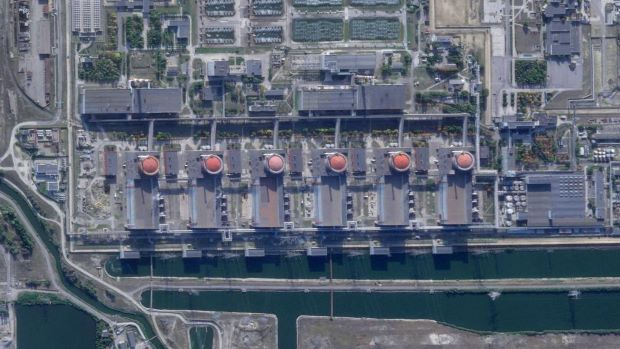UN atomic watchdog urges ‘security’ zone at Ukraine nuclear plant
KYIV – The UN’s atomic watchdog called Tuesday (6) for a security zone to be set up around Ukraine’s Zaporizhzhia nuclear power plant, which is occupied by Russia and been the site of recent shelling.
Russian troops seized control of the plant – Europe’s biggest atomic facility – in early March and there have been repeated attacks in the vicinity, sparking fears of a nuclear disaster, as both sides trade blame for shelling the site.
“The current situation is untenable,” the International Atomic Energy Agency (IAEA) said in a report after it sent a team of inspectors to the plant last week.
“There is an urgent need for interim measures to prevent a nuclear accident arising from physical damage caused by military means,” the IAEA said.
“This can be achieved by the immediate establishment of a nuclear safety and security protection zone,” it added in its report.
“The IAEA recommends that shelling on site and in its vicinity should be stopped immediately to avoid any further damages to the plant and associated facilities,” it said.
Moscow-installed official in Zaporizhzhia Vladimir Rogov criticized the idea of a security zone, saying instead what was needed to protect the plant’s integrity was agreement on implementing a ceasefire.
“In other words, if something happens in the perimeter of the nuclear plant, those who fired will immediately and severely be punished,” the Tass news agency quoted him as saying.
The commissioner for human rights in the Ukrainian parliament Dmytro Lubinets said the report “pays almost no attention to the facts related to the safety of the personnel and the war crimes committed by the Russian servicemen in relation to the employees of the nuclear plant: murder, torture, illegal arrests and criminal prosecution, etc”.
Russia Tuesday accused Ukraine of repeatedly shelling around the nuclear plant.
There were seven strikes on the territory of the plant, Rogov said on social media.
“Ukrainian soldiers opened fire on Energodar and its surroundings,” damaging a power line and reducing the capacity of the last working reactor, Rogov said.
In the past 24 hours, the territory of the nuclear plant and its neighbouring city of Energodar were hit 15 times, the Russian defence ministry said in its daily briefing.
“Kyiv continues its provocations at the Zaporizhzhia nuclear power plant in order to create a threat of a man-made disaster,” the ministry added.
Radiation levels around the plant are “normal”, according to the ministry.
The UN atomic watchdog had sent a 14-person team to the site last week to assess the situation.
At least two members of the team were to remain on a permanent basis to ensure the facility’s safety.
On Monday (5), the last working reactor at the embattled nuclear plant was disconnected from the grid after shelling caused a fire.
Ukrainian Deputy Prime Minister Iryna Vereshchuk Tuesday called for a humanitarian corridor to be established for civilians wanting to leave the area around the nuclear plant.
A pro-Kremlin official in the Russian-controlled port city of Berdyansk in southern Ukraine was “seriously” injured in a car blast Tuesday, Moscow-installed authorities said.
The car of city commandant Artem Bardin exploded in “the very centre of Berdyansk”, Rogov said on social media, calling the incident a “terrorist attack”.
Bardin is in a “serious condition and has been hospitalized”, according to Rogov.
In the past months, several officials installed by Russian forces in Moscow-controlled territories in Ukraine have been killed or wounded in attacks.
Kyiv has not formally claimed responsibility.
Ukraine has claimed its first gains in a counter-offensive against the Russian army in the south, saying it has recaptured several areas and destroyed multiple targets.
A US official said Tuesday that Russia is buying large amounts of ammunition from North Korea to replenish stocks depleted by months of intense fighting in Ukraine.
“The Russian Ministry of Defence is in the process of purchasing millions of rockets and artillery shells from North Korea for use on the battlefield in Ukraine,” the US official said in a statement.
“This purchase indicates that the Russian military continues to suffer from severe supply shortages in Ukraine, due in part to export controls and sanctions,” the official said, on grounds of anonymity.
Western sanctions have made it harder for Moscow to acquire components to manufacture replacements, including computer chips.
President Vladimir Putin attended large-scale military exercises Tuesday involving China and several Russia-friendly countries, as Moscow seeks to strengthen partnerships in Asia in the face of Western sanctions.
And the European Commission laid out Tuesday the new hurdles facing Russian travellers seeking EU entry visas, in the latest punitive measures taken in response to Moscow’s invasion of Ukraine.
Ministers from EU member states agreed last week to suspend the 2007 EU-Russia visa facilitation deal, stopping short of an outright travel ban.
-Agence France-Presse



Comments are closed, but trackbacks and pingbacks are open.